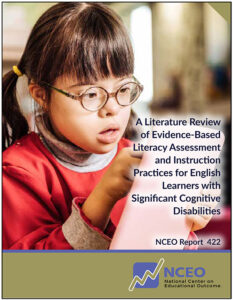 NCEO has published A Literature Review on Evidence-Based Literacy Assessment and Instruction Practices for English Learners with Significant Cognitive Disabilities (NCEO Report #422). This report summarizes a comprehensive investigation of research published between 2000 and 2018 on evidence-based literacy assessment and instruction practices for English learners with the most significant cognitive disabilities. Our goal is to provide policymakers and educators with actionable findings from the literature.
NCEO has published A Literature Review on Evidence-Based Literacy Assessment and Instruction Practices for English Learners with Significant Cognitive Disabilities (NCEO Report #422). This report summarizes a comprehensive investigation of research published between 2000 and 2018 on evidence-based literacy assessment and instruction practices for English learners with the most significant cognitive disabilities. Our goal is to provide policymakers and educators with actionable findings from the literature.
The Every Student Succeeds Act (ESSA) requires 95% participation in state achievement testing and allows for up to 1.0% of all test-takers in a subject area to participate in alternate assessments based on alternate academic achievement standards (AA-AAAS). For English learners with significant cognitive disabilities, the AA-AAAS should be designed to meet their linguistic and cultural needs. In order to accomplish this, assessment developers and implementers need evidence-based practices for appropriately assessing these students. However, a well-designed assessment is not enough in itself. To fully and meaningfully participate in an AA-AAAS, English learners with significant cognitive disabilities need meaningful access to the grade-level standards-based curriculum prior to taking the assessment. Literacy is one key area in which evidence-based practices—specifically for second language learners with disabilities—are urgently needed.
None of the available literature addressed literacy assessment for students in this population. Instead, the focus of the literature was on appropriate instruction. In general, the reviewed literature suggested that, in the absence of extensive research, it is appropriate to adapt literacy practices proven to be effective for native English speakers with significant cognitive disabilities to support the English proficiency of individual learners.
The literature found that the effectiveness of first language supports varied according to the background of individual students and the language the student spoke. Supports included in studies were primarily offered in Spanish, indicating a need for research on effective supports in other languages. Many of the reviewed studies indicated the potential benefit of technology-enhanced interventions for teaching literacy skills.
Recommendations are provided for needed research, both in terms of topics and research designs. In addition, the development of explicit criteria for identifying students who are English learners with significant cognitive disabilities is recommended to help to ensure that future research contributes useful information for the field.
